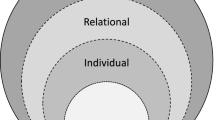Abstract
Clinical research coordinators (CRCs) assume critical responsibilities central to the success of the research team. The complexity of their role requires essential professional qualifications. One barrier to professionalization, however, has been the inconsistent, or absent, competency-based training. This study explored participants’ perceptions of training experiences designed to prepare them for the national certification exam. Focus group methodology was used to document their experiences. The findings showed that sustainable mentoring relationships developed, participant confidence levels increased, and anxiety about performance capacity diminished. Cognitive reframing of the work environment and CRC roles was facilitated by training that fostered sharing and social reinforcement of professional and personal identities. Findings from this study suggest that access to meaningful training and quality instruction supports the professionalization of CRCs.
Similar content being viewed by others
References
Davis AM, Hull SC, Grady C, Wilfond BS, Henderson GE. The invisible hand in clinical research: the study coordinator’s critical role in human subjects protection. J Law Med Ethics. 2002;30(3):411–419.
Speicher LA, Fromell G, Avery S, Brassil D, Carlson L, Stevens E; on behalf of the CTSA Research Coordinator Taskforce. The critical need for academic health centers to assess the training, support, and career development requirements of clinical research coordinators: recommendations from the Clinical and Translational Science Award Research Coordinator Taskforce. Clin Transl Sci. 2012;5(6):470–475.
Silva H, Stonier P, Buhler F, et al. Core competencies for pharmaceutical physicians and drug development scientists. Front Pharmacol. 2013;4:105.
Dickler HB, Korn D, Gabbe SG. Promoting translational and clinical science: the critical role of medical schools and teaching hospitals. PLoS Med. 2006;3(9):e378.
Glickman SW, McHutchison JG, Peterson ED, et al. Ethical and scientific implications of the globalization of clinical research. N Engl J Med. 2009;360(8):816–823.
Sung NS, Crowley WF Jr., Genel M, et al. Central challenges facing the national clinical research enterprise. JAMA. 2003;289(10):1278–1287.
World Health Organization. Transforming and Scaling up Health Professionals’ Education and Training: World Health Organization Guidelines 2013. http://apps.who.int/iris/bitstream/10665/93635/1/9789241506502_eng.pdf.
TSA Central. Establishing Good Clinical Practice Standards in the CTSA Program and Beyond. https://ctsacentral.org/consortium/establishing-good-clinical-practice-standards-in-the-ctsa-program-and-beyond/. Accessed February 25, 2017.
Sonstein SA, Seltzer J, Li R, Jones CT, Silva H, Daemen E. Moving from compliance to competency: a harmonized core competency framework for the clinical research professional. Clin Res. 2014;June:17–23.
Proceedings from the Core Competencies in Clinical Research: Real World Applications, Convergence and Evolution of a Framework, Cambridge, MA, Multi-Regional Clinical Trials Center of Brigham and Women’s Hospital and Harvard (MRCT Center), 2016. http://mrctcenter.org/wp-content/uploads/2016/12/2016-10-19-Core-Competencies-Workshop-Proceedings.pdf. Accessed December 11, 2016.
Shanely T, Masour G, Baron R. Enhancing clinical research professionals’ training and qualifications (ECRPTQ) competency assessments. http://www.ctsa-gcp.org/uploads/3/9/2/5/39256889/ecrptq_assessments_103015_a2.pdf. Accessed April 7, 2016.
Calvin-Naylor NA, Jones CT, Wartak MM, et al. Education and training of clinical and translational study investigators and research coordinators: a competency-based approach. J Clin Trans Sci. 2017;1:16–25.
Shanely TP, Calvin-Naylor NA, Divecha R, et al. Enhancing clinical research professionals’ training and qualifications (ECRPTQ): recommendations for Good Clinical Practice (GCP) training for investigators and study coordinators. J Clin Trans Sci. 2017;1:1–8.
US Food and Drug Administration. Guidance for industry, investigator responsibilities: protecting the rights, safety, and welfare of study subjects. http://www.fda.gov/downloads/Drugs/GuidanceComplianceRegulatorylnformation/Guidances/UCM187772.pdf. Accessed October 4, 2017.
Behar-Horenstein LS, Bajwa W, Kolb HR, Prikhidko A. A mixed method approach to assessing online dominate GCP training platforms. Clin Res. In press.
Behar-Horenstein LS, Potter JP, Alena Prikhidko A, Swords S, Sonstein SH, Kolb HR. Training impact on novice and experienced research coordinators. Qual Rep. In press.
Bowers J, Kumar P. Students’ perceptions of teaching and social presence: a comparative analysis of face-to-face and online learning environments. Int J Web Based Learn Teach Technol. 2015;10(1):27–44.
Zhan Z, Mei H. Academic self-concept and social presence in face-to-face and online learning: perceptions and effects on students’ learning achievement and satisfaction across environments. Comput Educ. 2013;69:131–138.
Author information
Authors and Affiliations
Corresponding author
Rights and permissions
About this article
Cite this article
Behar-Horenstein, L.S., Prikhidko, A. & Kolb, H.R. Advancing the Practice of CRCs Why Professional Development Matters. Ther Innov Regul Sci 52, 708–717 (2018). https://doi.org/10.1177/2168479017750128
Received:
Accepted:
Published:
Issue Date:
DOI: https://doi.org/10.1177/2168479017750128



